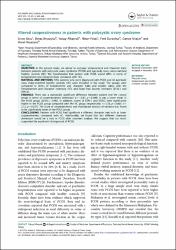| dc.contributor.author | Aksu, Erson | |
| dc.contributor.author | Beyazyüz, Elmas | |
| dc.contributor.author | Albayrak, Yakup | |
| dc.contributor.author | Potas, Nihan | |
| dc.contributor.author | Durankuş, Ferit | |
| dc.contributor.author | Uvaçin, Gamze | |
| dc.contributor.author | Beyazyüz, Murat | |
| dc.date.accessioned | 2022-05-11T14:05:08Z | |
| dc.date.available | 2022-05-11T14:05:08Z | |
| dc.date.issued | 2019 | |
| dc.identifier.issn | 2475-0573 | |
| dc.identifier.uri | https://doi.org/10.1080/24750573.2019.1691357 | |
| dc.identifier.uri | https://hdl.handle.net/20.500.11776/4901 | |
| dc.description.abstract | OBJECTIVE: In the present study, we aimed to compare temperament and character traits between patients with polycystic ovary syndrome (PCOS) and age-body mass index-matched healthy controls (HC). We hypothesized that patient with PCOS would differ in terms of temperament and character traits compared with HCs. MATERIAL AND METHODS: Fifty patients who were diagnosed with PCOS and 42 age-body mass index-matched healthy controls (HC) were included in the study. The groups were compared in terms of temperament and character traits and anxiety status with the Temperament and Character Inventory (TCI) and State-Trait Anxiety Inventory (STAI-1 and STAI-2). FINDINGS: There was a statistically significant difference between patient and the control group in terms of cooperativeness dimension (t = ?2.81; p = 0.006). It was a lower mean in the PCOS group (20.98 ± 2.992). In addition, scores of STAI-1 and STAI-2 were significantly higher in the PCOS group compared with the HC group (respectively; t = 5.70; p < 0.001; t = 2.12; p = 0.037). The score of cooperativeness and multivariate analysis of variance was found to be significantly lower in the PCOS group. CONCLUSIONS: Patients with PCOS had significant a different character trait such as lower cooperativeness compared with HC. Additionally, we found that this different character dimension would be a trait in PCOS after covariant analysis. We suggest that our result supported the psychiatric background of PCOS. © 2019, © 2019 The Author(s). Published by Informa UK Limited, trading as Taylor & Francis Group. | en_US |
| dc.language.iso | eng | en_US |
| dc.publisher | Taylor and Francis Ltd. | en_US |
| dc.identifier.doi | 10.1080/24750573.2019.1691357 | |
| dc.rights | info:eu-repo/semantics/openAccess | en_US |
| dc.subject | anxiety | en_US |
| dc.subject | character | en_US |
| dc.subject | personality | en_US |
| dc.subject | Polycystic ovary | en_US |
| dc.subject | temperament | en_US |
| dc.subject | women | en_US |
| dc.subject | adult | en_US |
| dc.subject | anxiety | en_US |
| dc.subject | Article | en_US |
| dc.subject | behavior assessment | en_US |
| dc.subject | body mass | en_US |
| dc.subject | clinical article | en_US |
| dc.subject | controlled study | en_US |
| dc.subject | cooperation | en_US |
| dc.subject | demography | en_US |
| dc.subject | female | en_US |
| dc.subject | human | en_US |
| dc.subject | ovary polycystic disease | en_US |
| dc.subject | psychometry | en_US |
| dc.subject | self transcendence | en_US |
| dc.subject | State Trait Anxiety Inventory | en_US |
| dc.subject | temperament | en_US |
| dc.subject | Temperament and Character Inventory | en_US |
| dc.subject | transvaginal echography | en_US |
| dc.title | Altered cooperativeness in patients with polycystic ovary syndrome | en_US |
| dc.type | article | en_US |
| dc.relation.ispartof | Psychiatry and Clinical Psychopharmacology | en_US |
| dc.department | Fakülteler, Tıp Fakültesi, Dahili Tıp Bilimleri Bölümü, Ruh Sağlığı ve Hastalıkları Ana Bilim Dalı | en_US |
| dc.identifier.volume | 29 | en_US |
| dc.identifier.issue | 4 | en_US |
| dc.identifier.startpage | 880 | en_US |
| dc.identifier.endpage | 886 | en_US |
| dc.institutionauthor | Beyazyüz, Elmas | |
| dc.institutionauthor | Albayrak, Yakup | |
| dc.institutionauthor | Uvaçin, Gamze | |
| dc.institutionauthor | Beyazyüz, Murat | |
| dc.relation.publicationcategory | Makale - Uluslararası Hakemli Dergi - Kurum Öğretim Elemanı | en_US |
| dc.authorscopusid | 55314280200 | |
| dc.authorscopusid | 55773915300 | |
| dc.authorscopusid | 29067508300 | |
| dc.authorscopusid | 36523620300 | |
| dc.authorscopusid | 55315126400 | |
| dc.authorscopusid | 57211958768 | |
| dc.authorscopusid | 27967486000 | |
| dc.identifier.wos | WOS:000498380300001 | en_US |
| dc.identifier.scopus | 2-s2.0-85075541084 | en_US |



















